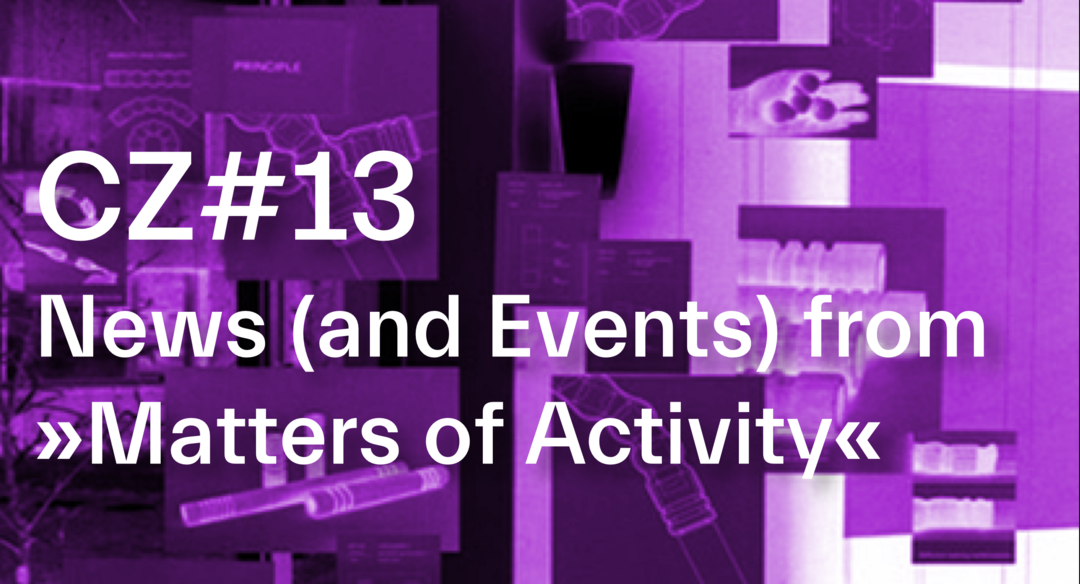|
|
 |
 |
|
|

|
 |
CZ#13 Header Image: Captured during Final Presentation of »Scaling Nature (2)«, adapted by »Matters of Activity«. Copyright: »Matters of Activity« |
|
Editorial Dear friends of »Matters of Activity«,
today's CZ# is slightly shorter for a given reason. Due to the Senate's decision, the Humboldt-Universität zu Berlin has decided to cancel all public events until July 20th. We are hoping to thus flatten the curve and help prevent a further outbreak.
Nevertheless, you can find information about the originally planned events, information about past events, press reviews, new members and information about a publication in this CZ#.
We hope that you and your family stay strong and healthy and that we can resume regular operations as soon as possible!
Happy Reading!
Your Science Communication Team
Antje, Eva and Franziska
|
 |
|
Liebe Freunde von »Matters of Activity«,
die heutige CZ# fällt aus gegebenem Anlass etwas kürzer aus. Aufgrund des Senatsbeschlusses hat die Humboldt-Universität zu Berlin entschieden, alle öffentlichen Veranstaltungen bis zum 20. Juli 2020 abzusagen. Wir hoffen, dass wir damit die Kurve abflachen und einen weiteren Ausbruch verhindern können.
Dennoch findet ihr in der CZ# Hinweise zu den ursprünglich geplanten Veranstaltungen, Informationen zu vergangenen Events, Pressestimmen, neue Mitglieder und den Hinweis zu einer Publikation.
Wir hoffen, dass ihr und eure Familie stark und gesund bleibt und wir den regulären Betrieb schnellstmöglich wieder aufnehmen können!
Viel Spaß beim Lesen wünscht euer Team der Wissenschaftskommunikation
Antje, Eva und Franziska
|
 |
|
|
|
|
 |
| All Events Canceled until 20 July 2020 |
| Humboldt-Universität zu Berlin Decides to Cancel All Its Events |
 |
|
|

|
 |
|
12.3.2020
|
 |
|
Due to the situation and pandemic outbreak, we were canceling all events until July 20th 2020. All lectures requiring personal attendance in research and teaching (including lectures, preparation courses, workshops, symposia, colloquia, excursions or language courses) were also canceled during the non-lecture period.
→ more
|
 |
|
Vor dem Hintergrund der steigenden Infektionszahlen und der weiteren Ausbreitung des Coronavirus, sagen wir alle Veranstaltungen bis zum 20. Juli 2020 ab. Alle Präsenzveranstaltungen in Forschung und Lehre (z.B. Vorlesungen, Vorbereitungskurse, Workshops, Symposien, Kolloquien, Exkursionen oder Sprachkurse) werden für die vorlesungsfreie Zeit bis 20. April ebenso abgesagt. Wir hoffen, unsere Pläne auf die zweite Jahreshälfte verschieben zu können.
Die tagesaktuellen Informationen können hier nachgelesen werden: ↗ hu.berlin/corona
Bleibt gesund!
|
 |
|
|
|
|
 |
| MoA Design Studio: Scaling Nature (2): Fibers, Muscles, Bones |
| Final Presentation at weißensee school of art and design berlin |
 |
|
|
 |
| »Scaling Nature (2): Fibers, Muscles and Bones« Final Presentation. Copyright: weißensee school of art and design |
 |
|
Event | Scaling Nature On February 11th, 2020 the final presentations of MoA Design Studio »Scaling Nature (2): Fibers, Muscles and Bones« took place in ↗ weißensee school of art and design. We are very happy that many MoA-Members were able to attend and discuss the students' works, as the final presentations showcased the inspiring journey of this semester's research-based design projects.
Based on the very positive feedback on this novel form of collaboration from both the designers and the biomaterial scientists, there will be a third iteration of this MoA Design Studio in the upcoming semester at weißensee with a focus on the topic of growth.
The initiators of Scaling Nature (→ Christiane Sauer, → Lorenzo Guiducci and → Khashayar Razghandi) recently welcomed the opportunity to reflect on Scaling Nature 1 & 2 at a Brown Bag Brunch (an internal Custer event) on March 3rd and discussed questions of bio-inspiration and the particular collaboration of the sciences in processes of designing prototypes, and the process of scaling in general.
Find more information on the website of the weißensee school of art and design:
↗ https://kh-berlin.de
|
 |
|
|
|
|
 |
| Age is Unnecessary: Shakespeare and Extreme Old Age |
| Talk by Stephen Greenblatt Canceled |
 |
|
Event Even before we had to cancel all public events, unfortunately, Stephen Greenblatt, member of the MoA Advisory Board, had to cancel his talk on »Age is Unnecessary: Shakespeare and Extreme Old Age« planned on March 17th at 5:00 pm in the Cluster. He has summarized his experiences on his return to the USA after his last stay in Europe in February in an article in the New Yorker on March 4th, which we are happy to share with you:
↗ https://www.newyorker.com/news/dispatch/the-strange-terror-of-watching-coronavirus-take-rome
Of course we will catch up on his talk as soon as possible!
|
 |
|
|
|
|
 |
| Materials and Time: An Anthology |
| Call for Proposal |
 |
|
Call Scholars from a wide spectrum of research fields are exploring the temporalities of materials, each from their own disciplinary perspective.
You are invited to produce texts of no more than 1000 words discussing the topic of »Materials and Time« for a forthcoming transdisciplinary publication and workshop. How authors wish to interpret this topic is left open, but they should focus on a single material, however construed. We welcome contributions from any discipline. Aspects of time to consider might include:
- lifetimes, lifecycles, use, trajectories, persistence, endurance, ageing
- depletion, peak, criticality, erosion, alteration, degradation, conservation
- re-use, remaining, recycling, returns, inheritances
- birthdays and anniversaries, death, decline, rebirth
- genealogies, time travel
- ephemerality, regimes of temporality, mimetism
- ages, epochs
- chronomarkers, signatures, records and measurements
Selected texts will be included in an anthology publication on this broad topic and their authors may be invited to a one-day workshop to be held in 2021. The workshop will contribute to the development of an interdisciplinary network on materials.
The deadline for submitting texts is April 30th, 2020. Texts should be submitted at the following web address:
↗ https://materialbiographies.typeform.com/to/kqrGV7
For more information or any queries please send an email to: materialbiographies@gmail.com ↗ more
|
 |
|
|
|
|
 |
| Berlin University Alliance Opened First Main Call Exploration Projects »Social Cohesion« |
| Call for Proposals for Interdisciplinary Research Projects for the Grand Challenge Initiative Social Cohesion within the Exploration Projects Funding Program |
 |
|
Call The overarching aim of the Exploration Projects Social Cohesion is to understand the global conditions, dynamics, perspectives and limitations of social cohesion and to demonstrate potential structures that could provide solutions for a future society characterized by sustainable success and stability. The funding program supports research on topics that demand new and innovative methods, questions, directions and approaches. In pursuing this goal, the Berlin University Alliance wants to explicitly show its support of groundbreaking projects that employ new approaches. An additional aim of the Exploration Projects is the development of larger, long-term research groups.
Funding totaling 1.35 million euros is available over a three-year period for interdisciplinary research teams in the Berlin area exploring the issue of social cohesion. The research teams should focus on socially relevant issues and bring together work undertaken by researchers within the Berlin University Alliance. The earliest possible project starting date is July 2020.
More information can be found here:
↗ https://www.berlin-university-alliance.de/en/commitments/grand-challenge-initiatives/call-social-cohesion_end/call-2020/index.html
Proposals should be submitted in German or English until May 4th, 2020. If your team is planning to apply, please contact moa.research.support@hu-berlin.de. ↗ more
|
 |
|
|
|
|
 |
| Rethinking Filter: Responsibility and Sustainability |
| Call for Manuscripts in Special Issue of »Sustainability« |
 |
|
Filtering | Call At the base of all everyday products, services and information we produce and consume, are filtering operations: From the processing of food to waste recycling to insurance policies and search engine feeds. Most knowledge we deal with on a daily basis is the product of filtering operations and filter algorithms that we do not necessarily always understand. Hence, filtering is of concern in various disciplines and fields: Whether it be synthetic biology or cyber security, nano-molecular machines or deep learning of AI, drug delivery or politics of immigration, the petrochemical industry or speculation in finance.
In the Special Issue of ↗ Sustainability the organizers would like to open up an interdisciplinary conversation about responsible filtering. Sustainability is an international peer-reviewed open access semimonthly journal published by MDPI.
Manuscripts can be submitted until May 31st, 2020. All papers will be peer-reviewed. Accepted papers will be published continuously in the journal (as soon as accepted) and will be listed together on the special issue website. ↗ more
|
 |
|
|
|
|